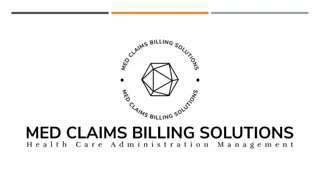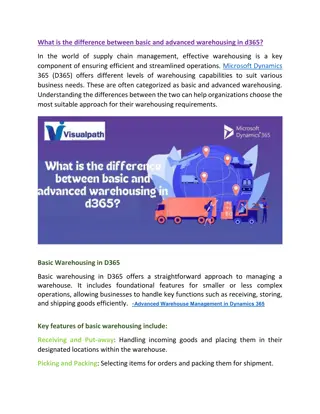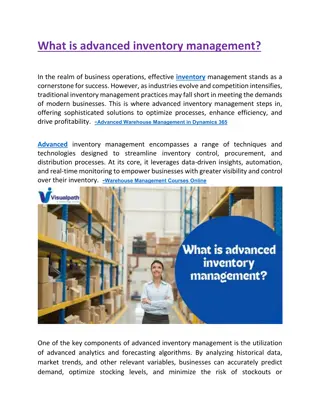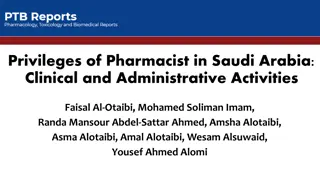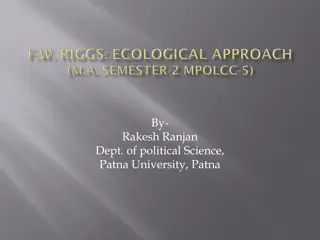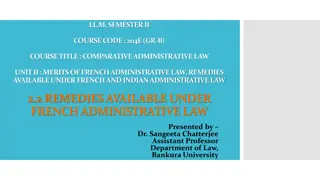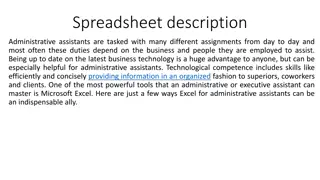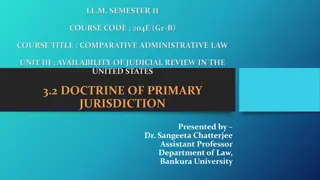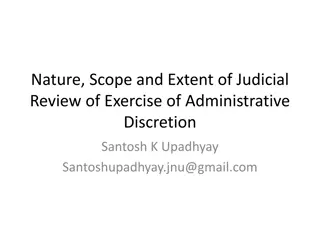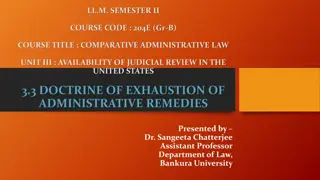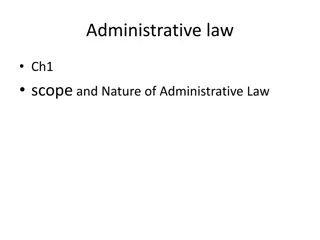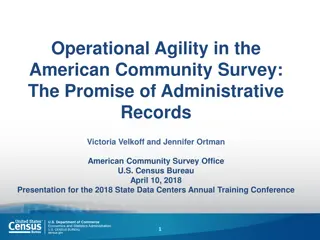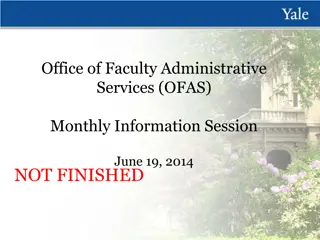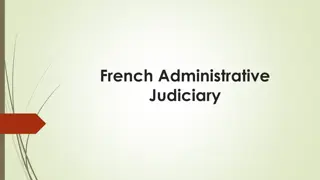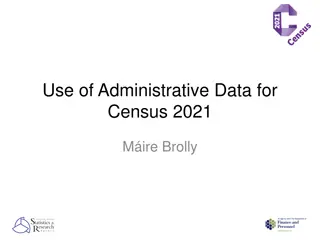
NIH Regional Seminar on Program Funding & Grants Administration Overview
This overview provides valuable insights from the NIH Regional Seminar on Program Funding & Grants Administration held on October 27-28, 2016. It covers complex aspects of projects, issues that contribute to complexity, thinking like a Federal agency, and critical factors considered by NIH in challenging situations. Key points include complex project aspects, challenging project issues, and NIH's perspective in decision-making. The seminar emphasized the importance of understanding all project dimensions, compliance with laws and policies, and safeguarding taxpayer investments.
Download Presentation

Please find below an Image/Link to download the presentation.
The content on the website is provided AS IS for your information and personal use only. It may not be sold, licensed, or shared on other websites without obtaining consent from the author. If you encounter any issues during the download, it is possible that the publisher has removed the file from their server.
You are allowed to download the files provided on this website for personal or commercial use, subject to the condition that they are used lawfully. All files are the property of their respective owners.
The content on the website is provided AS IS for your information and personal use only. It may not be sold, licensed, or shared on other websites without obtaining consent from the author.
E N D
Presentation Transcript
ADVANCED ADVANCED ADMINISTRATIVE ADMINISTRATIVE TOPICS TOPICS NIH REGIONAL SEMINAR ON PROGRAM FUNDING & GRANTS ADMINISTRATION OCTOBER 27-28, 2016
PRESENTERS Mary Kirker Chief Grants Management Officer National Institute of Allergy and Infectious Diseases Crystal Wolfrey Chief Grants Management Officer National Cancer Institute 2
WHAT ARE SOME ASPECTS THAT MAKE PROJECTS COMPLEX? Human Subjects Research Clinical trials research Multiple projects funded through single award Multiple collaborating institutions and/or PIs Foreign project/involvement 3
WHAT ARE SOME OF THE ISSUES AND CHANGES THAT MAKE PROJECTS COMPLEX? Change of Scope Delays in the Research Change of Grantee Organization Significant Changes in the Research Team Significant large balances accruing in the award Challenges Ensuring Compliance with Terms of Award Unexpected post award changes Close-out issues 4
THINKING LIKE A FED NIH Perspective When Considering Challenging Complex Situations First remember NIH is a Federal Agency Support Federal policy (Must enforce applicable laws, cost principles and administrative requirements) Support President's initiatives and policies. Stewards of Federal Funds 5
NIH PERSPECTIVE WHEN CONSIDERING CHALLENGING COMPLEX SITUATIONS Factors we consider critical in making decisions in 'tough' situations: Have we "listened" enough to really understand all the issues and objectives of the situation? What is best from a scientific or programmatic perspective (how will this impact the scope of the project)? What best serves the investment of the taxpayer in the project? Will the action create issues for protection of subjects? 6
NIH PERSPECTIVE WHEN CONSIDERING CHALLENGING COMPLEX SITUATIONS (CON T) Will an action create a precedent which will limit flexibility in the future? Is an action consistent with NIH, HHS or other Federal policy? Do we have the necessary funds to support the proposed arrangements? (NIH's large budget doesn't result in broad fiscal flexibility) How would this play if presented on the evening news or the front page of ......? 7
NIH PERSPECTIVE WHEN CONSIDERING CHALLENGING COMPLEX SITUATIONS - SECONDARY CONSIDERATIONS What is in the best interests of the PI(s)? What is in the best interest of the institution(s)? Is there an opportunity for a 'win/win'? Remember consultants, consortiums, subcontractors are not a direct party to the grant with the NIH. 8
HUMAN SUBJECTS RESEARCH AND CLINICAL STUDIES Multi-Center Clinical Trials Capitation Models Insurance/Indemnification Conflict of Interest IND/Clinical Trials http://clinicaltrials.gov/ Patient Recruitment Issues Patient Protection and Safety 9
HUMAN PROTECTION AND SAFETY Informed consent FWAs and IRB approval DSMP/DSMB Adverse Events 10
PURELY HYPOTHETICAL SITUATION DSMB recommends that a protocol should end early. The grant is scheduled to end in December 2017. What happens next? What are the options for moving forward? 11
PURELY HYPOTHETICAL SITUATION A clinical trial project is entering the third year of support and the RPPR reports that few subjects have been accrued to date. Accrual was originally supposed to be completed by the end of the third year to allow for analysis in the final years. What questions would NIH ask? What options are there for continued funding? The Investigator indicates that changes to the protocol are necessary What are important considerations? What approvals might be required?
CHANGE OF GRANTEE ORGANIZATION NIH prior approval is required for the transfer of the legal and administrative responsibility for a grant- supported project. The grant is awarded to the grantee institution not to the PI. In addition, a change of grantee involving the transfer of a grant to or between a foreign institution requires the ICs Council approval. A change of grantee organization may involve the transfer of equipment purchased with grant funds. 13
CHANGE OF GRANTEE ORGANIZATION (CONT.) Request must be made before the anticipated start date at the new organization and preferably several months in advance. A change of grantee request normally will be permitted only when all of the permanent benefits attributable to the original grant can be transferred, including equipment purchased in whole or in part with grant funds. A change may be made without peer review, provided the PI plans no significant change in research objectives and the facilities and resources at the new organization will allow for successful performance of the project. 14
PURELY HYPOTHETICAL SITUATION The PI on the project has accepted a position at a new organization and wants to take his/her grant, but the recipient organization does not want to relinquish the grant. What are the options for the recipient? What are NIH s options? 15
PURELY HYPOTHETICAL SITUATION Relinquishing Statement from previous grantee indicates all funds were used within 1 month of the budget period. Transfer application provided zero funds for the current year with 11 months remaining. There are 2 years remaining in the project period. What would some of NIH s concerns be? What do questions would NIH have for the original recipient? What questions would NIH have for the new organization? What documentation would NIH need to proceed with the award and what are the options for issuing the transfer award with no funds for the remaining 11 months? 16
PRINCIPAL INVESTIGATORS AND KEY PERSONNEL If a PI/key personnel (named in the Notice of Award) is absent from the project continuously for 3 months or more, or reduces approved effort devoted to the project by 25% or more from the original award THIS REQUIRES NIH PRIOR APPROVAL! 17
MULTIPLE PIS Changes in Multiple PI s Single to Multi or Vice Versa: NIH Grants Policy Statement, Section 9.5 NIH policy allows for post award PD/PI changes with the prior approval of the Grants Management Officer it is expected such requests will be rare. Must have adequate scientific justification, including any proposed changes in scope or budgetary changes, for the proposed addition/change/removal of multi-PI. A new or revised Leadership Plan is required if the change impacts the number of PIs. For prior approval requests including requests to add/drop a PI, the recipient organization is responsible for securing and retaining the required signatures from all PD/PIs 18
MULTIPLE PIS(CONT.) Leadership Plan must address the following elements: Designation of a contact PD/PI who is associated with the recipient organization. Roles/areas of responsibility of all of the PD/PIs. Describe governance and organizational structure of leadership team, including communication plans, plans for handling publications and intellectual property, and process for making decisions on scientific direction and procedures for resolving conflicts 19
PURELY HYPOTHETICAL SITUATION A multi-PI project has been a productive team for years. One of the PI s moves in the -05 year, and a large consortium award is issued to continue the collaboration. In the -07 year, while working on the competitive renewal, significant scientific, budgetary, (and personal?) differences arise. The PI s have a falling out and the PI at the consortium is voted out of the project. The PI is notified of the decision by email and is told no consortium costs will be covered as of the date of the email. The consortium PI contacts NIH, hinting at possible budget mismanagement and scientific misconduct, and demanding NIH hold the prime grantee to the terms of the peer reviewed Leadership plan. What are some options to resolve this? 20
PURELY HYPOTHETICAL SITUATION RPPR reports no anticipated balance in the project; however a review of the Payment Management System reflects that the recipient has not yet disbursed any of the funds awarded in the current award. What questions would NIH ask? What options are there for continued funding?
PURELY HYPOTHETICAL SITUATION Grantee contacted GMS: I cannot closeout my grant and my FFR is getting rejected in eRA Commons because it is saying I over spent funds. How can you fix this? How would you approach this type of scenario? Where would you go for guidance? What are the steps involved to remedy issue? 22
PURELY HYPOTHETICAL SITUATION Final FFR reflects less money expended than what is shown in the PMS as disbursed. What should happen at the time the FFR is completed? What can be done if the PMS is correct and the FFR is wrong? What can be done if the FFR is correct and the FFR is wrong? What can be done if the grant is closed out?
TERMS OF AWARD NOTICE OF AWARD SECTIONS III & IV Terms of Award come from: Authorizing program legislation legislation that sets up or continues the legal operation of a federal program or agency and the terms and conditions under which it operates. The NIH Grants Policy Statement http://grants.nih.gov/grants/policy/nihgps/nihgps.pdf Administrative Requirements Programmatic Requirements (written in a Cooperative Agreement RFA, and incorporated in full or by reference in the Notice of Award)
RESTRICTIVE TERMS There are two types of restrictive terms: One which restricts the use of funds for a purpose (Example: for purchasing a specific piece of equipment), A Temporary Restriction of all or a specified amount of funds until issues or assurances have been resolved. OR Restrictions are only lifted by a Revised Notice of Award.
PROGRAMMATIC TERMS OF AWARD Programmatic Terms of Award are a part of all Cooperative Agreements awards They are specific to the grant solicitation (RFA/FOA) and/or award. They are organized in the following sections: Applicability Awardee Rights and Responsibilities NIH Staff Responsibilities Collaborative Responsibilities Arbitration
PURELY HYPOTHETICAL SITUATION A grant is awarded with a restriction at the end of the fiscal year because the IRB approval is pending The IRB is approved and the institution submits the approval to the awarding IC. Is anything else needed to initiate patient recruitment? 27
PURELY HYPOTHETICAL SITUATION An individual was listed as Key Personnel on the NoA. He/she left the grant 2 months prior to the end of the budget period. What does NIH expect to happen? Would NIH look differently at the situation if the individual was not designated Key on the NoA but was a project leader on a program project?
PURELY HYPOTHETICAL SITUATION A PI s awarded grant involves the use of rats. His progress report describes an experiment using mice. _____________ What issues if any does this raise? 29
PURELY HYPOTHETICAL SITUATION A PI has multiple NIH grants from one IC, all involving work with mice. One of the grants has not yet been competitively renewed. A small portion of the colony needs to be maintained, so the PI charges the animal care costs to one of her other NIH grants? _________________ Does this present any issues? 30
PURELY HYPOTHETICAL SITUATION The grantee purchased visa gift cards in the amount of $4,000 to be used as incentive costs for patients participating in human subjects research. The University has inquired if they may buy back the remaining gift cards totaling $4,000 to be used on another grant. Is this allowable? Where would you look and what would you do?
PURELY HYPOTHETICAL SITUATION For a protocol blood is sent to a local lab for standard testing . Is this a subaward? Does the lab need to meet compliance requirements? What about F&A? 32
PURELY HYPOTHETICAL SITUATION A foreign sub-site on an R01 award requested grant funds to renovate space at their current location to house a new generator for liquid nitrogen The request stated that housing the liquid nitrogen generator would require building a simple structure to an already existing building. This structure would ensure that the equipment was secured and protected. The sub-site would work with a local contractor to build-out a walk-way, fence, roof, and slab. This pathway would extend from the front entrance of their building allowing easy access and use. Is this request A&R, Modernization, or construction? Would you approve this request, if so, why? 33
COMMUNICATION BETWEEN DEPARTMENT AND SPONSORED PROJECTS IS CRITICAL Many solutions are organizationally culture- driven. For example, if good communication is part of the culture, then it is more likely to support good management practices, such as work groups across departmental boundaries. Current, written, and accessible policies and procedures are a must. All parties involved must know and understand and comply with the rules, policies guidelines. If not, well outcomes are not likely to be positive. 35
RESOURCES I. Your Organization Sponsored Programs Office Accounting Office Internal Auditor IRBs IACUCs II. NIH Grants Management Specialist Program Administrator Office of Laboratory Animal Welfare (OLAW) http://grants.nih.gov/grants/olaw/olaw.htm Office of Financial Management http://ofm.od.nih.gov Grants Policy & Guidance http://grants.nih.gov/grants/policy/policy.htm III. DHHS Office for Human Research Protections (OHRP) 36
RESOURCES FOR COMPLIANCE Tips, methods, what to do? So many resources, only a select few are named here. NIH Grants Compliance and Oversight website has compendium of observations, and presentations http://grants.nih.gov/grants/compliance/compliance.htm NIH Grants Compliance Inbox grantscompliance@mail.nih.gov NIH Outreach Activities http://grants.nih.gov/grants/outreach.htm 37
SELECT RESOURCES AT THE NIH Grants Management Specialist on the Notice of Award - If unknown, contact Chief GMO of IC: http://grants.nih.gov/grants/stafflist_gmos.htm Program Official on the Notice of Award Office of Extramural Research: http://grants.nih.gov/grants/oer.htm NIH Grants Information: http://grants.nih.gov/grants/giwelcome.htm NIH Grants Policy Inbox (policy questions not specific to the NoA): grantspolicy@mail.nih.gov Division of Financial Advisory Services: http://oamp.od.nih.gov/dfas 38
Questions? 39



